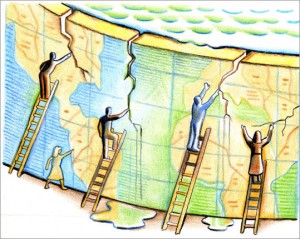No Big Deal
 My latest column in The Boston Globe explores the alternative to sweeping international agreements: little incremental solutions that might, in fact, do better at addressing the world’s ills.
My latest column in The Boston Globe explores the alternative to sweeping international agreements: little incremental solutions that might, in fact, do better at addressing the world’s ills.
The great international problems of our time beggar the imagination: global warming, pandemics, war crimes, nuclear proliferation, just to name a few. Their complexity confounds the most agile of technocrats, and the stakes involved are high, affecting billions of people living under every sort of government.
For half a century, the conventional approach to these problems has been to build massive international treaties. Intricate worldwide problems demand an integrated approach — a grand bargain, so to speak, that addresses all the winners and losers in a single, encompassing agreement.
This is the animating assumption behind the world’s approach to global warming, for example. To persuade growing nations like China to limit their consumption of fossil fuels, the thinking goes, the world needs a comprehensive framework ensuring that more developed nations make equivalent sacrifices. The climate is simply too large a problem to address piecemeal, or by tinkering with minor symptoms.
But what if this approach results in less progress? What if more modest agreements — on climate change, loose nukes, and other sweeping problems — would yield better results than a long, noble quest for a grand bargain?
War Without Sacrifice
John Levi Barnard has written a powerful appeal to for us to take moral heed of the oil geyser in the Gulf of Mexico, abandon our wasteful ways, and embrace a kinder new paradigm.
There is a lesson to be learned here, as there was from the crisis of the 1850s, which is that there is a clear choice to be made between principle and the expedient solution, which is never a solution at all. Every president from Reagan to Obama has assured us that the American way of life is not negotiable, much as the great compromisers of the antebellum period assured us that nothing, not even Justice, would threaten the cohesion of the “union.”
Thoreau countered this in no uncertain terms, declaring in “Resistance to Civil Government” that the American “people must cease to hold slaves, and to make war on Mexico, though it cost them their existence as a people.” From the crisis in the Gulf of Mexico—which extends both literally and figuratively to the Persian Gulf and the borderlands of Pakistan—we can derive a similarly radical statement: we must stop drilling in the ocean though it costs us something at the pump, though it forces us to make our way of life negotiable.

